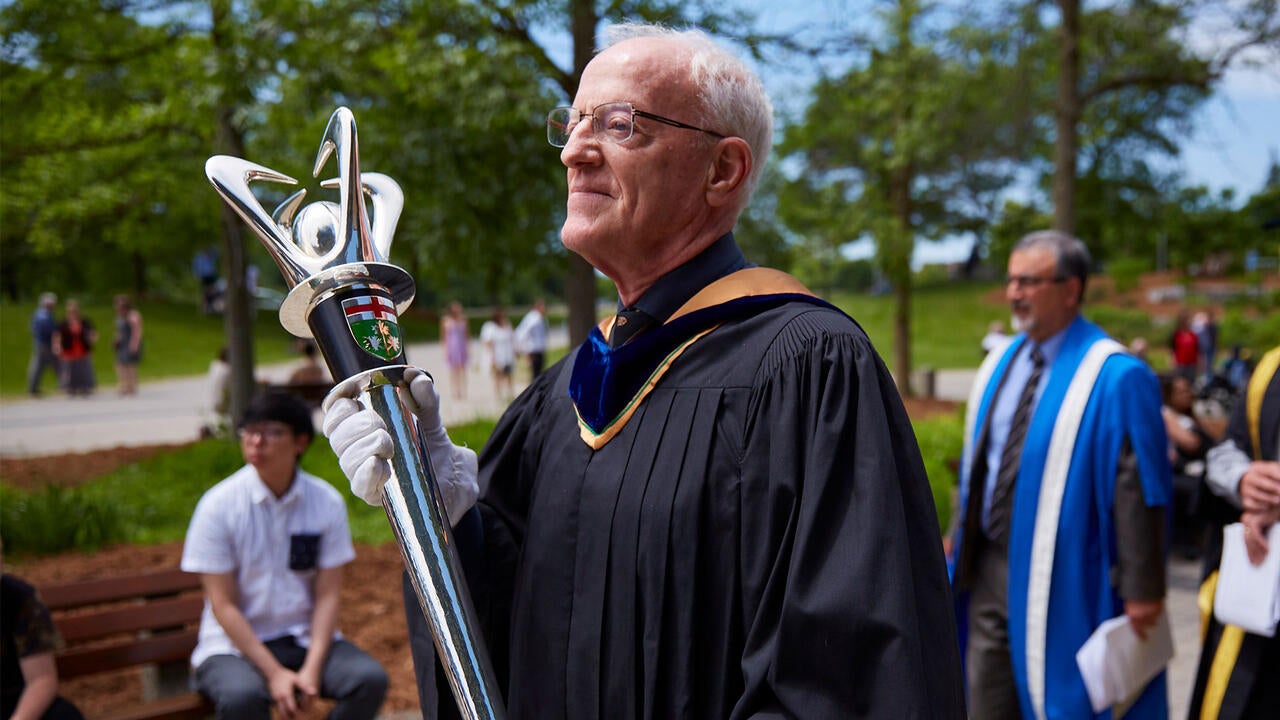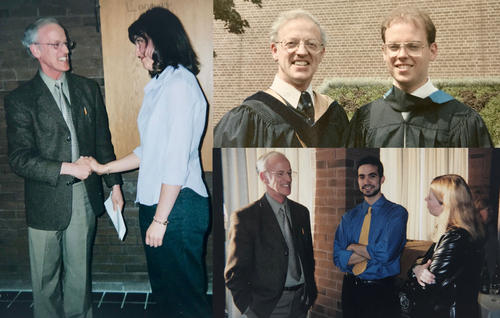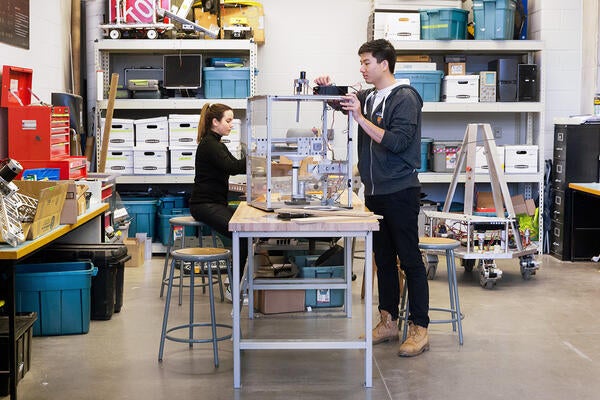
Waterloo Professor celebrates 50-years with University
Prof. of English Language and Literature John North had his first day with the University of Waterloo in 1968.

Prof. of English Language and Literature John North had his first day with the University of Waterloo in 1968.
By Natalie Quinlan & Susan Fish University Relations - Daily Bulletin
Since his first day in September 1968, it’s estimated that Professor and Distinguished Teacher John North has taught more than 20,000 students. And while that day stretches back 50+ years, North still remembers it vividly.
“My first day at UW was very embarrassing,” recounts North. “I tripped over the podium going into my first classroom and all of my papers went flying. The students were very gentle and none of them laughed. Perhaps they were as afraid as I was.”
Originally from British Columbia, North anticipated staying with the University for only a year before returning to, what he calls, the “la-la land of Canada.”
 “I never expected to be with the University as long as this,” smiled North. “I came from Vancouver, and I hoped to get back there as quickly as I could. So, I comforted myself as I was driving along from the Toronto airport to the University here: ‘Well, John, it’s only for a year, because surely you’ll get a job back in BC by next year.’ But, here I am.”
“I never expected to be with the University as long as this,” smiled North. “I came from Vancouver, and I hoped to get back there as quickly as I could. So, I comforted myself as I was driving along from the Toronto airport to the University here: ‘Well, John, it’s only for a year, because surely you’ll get a job back in BC by next year.’ But, here I am.”
While North’s five-decade stay wasn’t part of his original plan, he credits Waterloo’s top students and good relations with colleagues and University administration as big influencers.
“But even more than that, the freedom to teach,” said North. “To teach what I love to teach and to do research which I find engrossing. It’s a fine thing at my age to come and go with young people in their late teens and 20’s.”

It’s also the deep impressions that North could make on his students’ lives through literature that also influenced him to stay for so long.
“One of my fondest memories here at the University of Waterloo is of a student who said to me: ‘Professor North, you’re the only one who makes me cry in class.’ Of course it wasn’t me that made her cry, it was Shakespeare. My task was only to say: ‘Here’s Shakespeare, listen to what he has to say.’ Wonderful.”
 In reflecting, North also highlights Waterloo’s unique encouragement of faculty to form companies for the marketing and development of their research, a pivotal policy which has contributed to the economic development of KW. His own company, North Waterloo Academic Press, has published volumes by many scholars, as well as his own 69-volume Waterloo Directory of English Newspapers and Periodicals 1800-1900, reviewed as “the fourth great Humanities reference work of Great Britain, after Johnson’s English Dictionary, the Dictionary of National Biography and the Oxford English Dictionary.” This series now includes Scottish, Irish and Welsh periodicals. More than 400 students have worked with John on this project. The Directory enables scholars to identify primary sources, as well as the scholarship on each title, and then to read the full text by hyperlink from within the Waterloo Directory. This includes some 70,000 newspapers and periodicals, in all subjects, so users can read press reports of the day, such as the coronation of Queen Victoria, the ravages of cholera, the première of Handel’s Israel in Egypt at the 1846 Birmingham Music Festival, and the Crimean War.
In reflecting, North also highlights Waterloo’s unique encouragement of faculty to form companies for the marketing and development of their research, a pivotal policy which has contributed to the economic development of KW. His own company, North Waterloo Academic Press, has published volumes by many scholars, as well as his own 69-volume Waterloo Directory of English Newspapers and Periodicals 1800-1900, reviewed as “the fourth great Humanities reference work of Great Britain, after Johnson’s English Dictionary, the Dictionary of National Biography and the Oxford English Dictionary.” This series now includes Scottish, Irish and Welsh periodicals. More than 400 students have worked with John on this project. The Directory enables scholars to identify primary sources, as well as the scholarship on each title, and then to read the full text by hyperlink from within the Waterloo Directory. This includes some 70,000 newspapers and periodicals, in all subjects, so users can read press reports of the day, such as the coronation of Queen Victoria, the ravages of cholera, the première of Handel’s Israel in Egypt at the 1846 Birmingham Music Festival, and the Crimean War.

Alongside his teaching, North volunteers in Spiritual Care at Grand River Hospital and welcomes refugees arriving in KW (being a second-generation immigrant himself). From a blue-collar family, he rebuilds wrecked cars and motorcycles, and enjoys time with his wife Roberta, their three sons, 14 grandchildren, and, most recently, a Border Collie puppy.
You can read more about the 25 to 50-year University of Waterloo inductees in the Daily Bulletin.

Read more
Here are the people and events behind some of this year’s most compelling Waterloo stories

Read more
From groundbreaking research to top tech talent, the University powers Waterloo Region’s rise as a top tech hub and a leader in global innovation

Read more
Irfhana Zakir Hussain works to strengthen Waterloo’s capacity to withstand and recover from climate-related health crises
The University of Waterloo acknowledges that much of our work takes place on the traditional territory of the Neutral, Anishinaabeg, and Haudenosaunee peoples. Our main campus is situated on the Haldimand Tract, the land granted to the Six Nations that includes six miles on each side of the Grand River. Our active work toward reconciliation takes place across our campuses through research, learning, teaching, and community building, and is co-ordinated within the Office of Indigenous Relations.